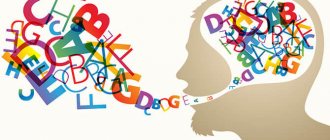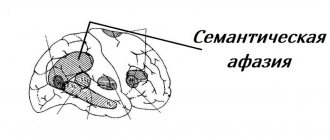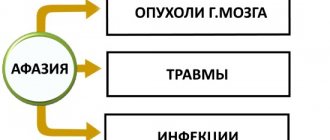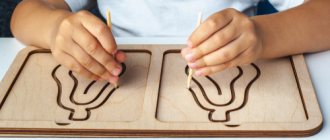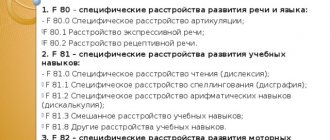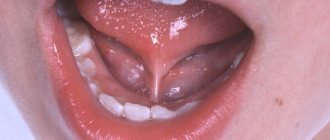Why does a person lose the ability to speak?
The main reason why already formed speech may disappear is a gross disruption of the functioning of areas of the cerebral cortex. The reasons for such a lesion in acoustic-gnostic aphasia can be any. These are injuries and strokes, neurodegenerative and infectious diseases, tumors. In children, the condition is most often caused by:
- traumatic brain injuries;
- abscesses inside the skull;
- cerebral aneurysms;
- meningitis and encephalitis.
There are other, no less serious reasons for the disappearance of speech skills. Aphasia may be the first symptom of these severe, life-threatening diseases, so if a child experiences a gradual decline in speech development, a visit to a neurologist is required. If speech is suddenly lost, you need to take a closer look at the child and consult with a neurologist as quickly as possible, who can examine the baby in person.
What are the reasons for this?
The etiology of the disease is associated with organic processes in brain structures that arose after the formation of speech. The pathology can be triggered by dysfunction of the brain as a result of injuries, inflammation in its areas, in the presence of malignant tumors, vascular diseases, or stroke.
Each factor has its own characteristics, so the course of aphasia differs depending on the disease. For example, if the pathology is caused by a tumor process, accompanying cortical symptoms arise, for example, a change in the patient’s psyche.
If speech impairment is caused by a stroke, the clinical picture is determined by the type of pathology and the area of development of ischemia. The post-traumatic type of disorder responds well to treatment, and the prognosis for the patient is favorable. The severity of the disease is influenced by the area of the lesion, localization (where the hemorrhage occurred), the nature of the cerebral circulation disorder, and the general condition of the patient (acute and chronic pathologies).
What does a patient's speech look like?
The central mechanism of acoustic-gnostic aphasia is the simultaneous loss of abilities for acoustic analysis and speech synthesis. Impressive speech impairments in acoustic-gnostic aphasia are caused by the loss of phonemic hearing—the ability to recognize individual sounds. Without distinguishing sounds, a person can neither understand a word nor pronounce it. Sometimes such a violation is total in nature, for such patients both speech and household noise sound the same. These are severe forms of the condition. In milder cases, the perception of only close phonemes is impaired - voiced and voiceless, hard and soft consonant sounds, and the nasal sounds [n] and [m] are confused. As a result, the words become unrecognizable. The word “words” can sound to such a patient as “anger”, “daughter” as “kidney”, as a result, complete disorientation in the speech stream occurs.
When pronouncing sounds, the patient also does not distinguish between phonemes. Therefore, the set of sounds that he pronounces looks like complete nonsense to an outside observer: it seems to the patient that he is pronouncing the word correctly, but the auditory analyzer cannot control the error made during articulation. This mechanism leads to the fact that in acoustic-gnostic aphasia, expressive speech is also impaired. At the same time, the patient’s behavior also suffers: he is annoyed that no one can understand him.
Symptoms of aphasia
Signs and symptoms of aphasia may be invisible to others, as compensatory processes are activated that conceal speech defects. In the early stages of the disease, symptoms may appear or disappear completely, so it is difficult to draw a clear line between impaired and normal speech. Aphasia is a systemic disorder in which not only the pronunciation side suffers, but also the understanding of speech, lexical and grammatical structure, reading and writing. Symptoms of aphasia also manifest themselves in neurological and mental abnormalities. Motor functions suffer, patients experience paralysis of the limbs and articulatory muscles. Voluntary movements acquired throughout life experience are impaired. So the patient seems to forget how to use cutlery and household items. Memory and attention are severely impaired, and thought processes are inhibited.
A.R. Luria identifies six main forms of aphasia: acoustic-gnostic (sensory), acoustic-mnestic, afferent motor, efferent motor, semantic and dynamic.
Up
How does the condition manifest?
The state of speech function in acoustic-gnostic aphasia is the main sign of serious problems in the central nervous system. This is a bright, conspicuous sign that will alert even a person far from medicine. In fact, acoustic-gnostic aphasia is a symptom of other pathologies of the nervous system.
A distinctive feature of acoustic-gnostic aphasia is precisely the loss of existing speech skills. This makes it different from various types of alalia and delayed speech development. In such cases, speech was not formed, and aphasia is when the child could already speak, but stopped doing so.
There are important features for diagnosing aphasia in children. This:
- the difficulty of assessing the patient’s speech development before the examination period regarding the lack of speech skills;
- the resulting difficulty in differentiating aphasia - a symptom of a life-threatening condition - and delayed speech development, which requires correction, but the patient is not in danger;
- Difficulties in assessing hearing typical for pediatrics.
The Center for Pediatric Speech Neurology and Rehabilitation "Neurospectr" employs doctors whose experience and knowledge help to cope with all these problems and determine whether the child needs emergency help. Modern diagnostic equipment helps them in this.
Semantic aphasia
Semantic aphasia occurs when the parieto-occipital region of the dominant hemisphere is damaged. The patient has difficulty finding the right word when naming objects; instead of a noun, they may say a verb or an adjective that describes the properties or functions of this object. Replace a word with a whole phrase (verbal paraphasia). For example, instead of the word chair they say white sit. They lose their understanding of proverbs, metaphors, and catchphrases, and form lexical and grammatical structures incorrectly. With limited vocabulary, articulation is preserved. Written speech is characterized by agrammatism, stereotypical phrases, the absence of complex sentences and a reduced number of adjectives.
Course of the disease
In the acute period, when the damaging factor (illness or injury) is actively acting, the patient may completely lose the ability to understand spoken speech and speak. At the same time, he does not realize that he is speaking incorrectly, since the control of the auditory analyzer, which helps healthy people evaluate errors in their own speech, does not work for him. Most often, at the initial stage of the disease, the patient experiences psychomotor agitation, which is accompanied by increased speech activity and irritation due to the fact that he is not understood.
When the damaging factor ceases to act, the severity of the damage received and the body’s ability to restore lost functions on its own can be assessed. There can be several outcomes - from severe aphasia, when the symptoms remain almost at the same level as in the acute period, to mild, when the patient confuses individual sounds and sometimes cannot correlate the type of object with its name, while describing the object or object itself - small, lively, fluffy, but without being able to name it - a puppy. Sometimes significant improvement occurs spontaneously, but consultation with a speech therapist is necessary even in this case.
Diagnosis of pathology
To determine the diagnosis, the patient is prescribed a computed tomography of the brain, magnetic resonance imaging, Doppler ultrasound of the vessels of the neck and head, and, if necessary, a lumbar puncture is performed. Speech diagnostics are carried out by assessing active and passive speech. Then the patient's writing abilities are tested: dictation, copying, reading aloud and retelling. It is mandatory to differentiate with other speech defects: alalia, dysarthria, etc.
In right-handed people, the left hemisphere “recognizes” consonants, and the right hemisphere “recognizes” vowels.
How to help your child talk again
In a number of diseases that can cause acoustic-gnostic aphasia, the patient needs long-term observation by a neurologist in order to promptly notice and correct the delayed consequences of the disease or injury, if they occur. Here we will not talk about specific drugs and methods; they are used in such cases: we are talking about very serious diseases that must be treated under the supervision of a specialist, with strict adherence to his prescriptions.
During treatment, it is important to restore speech function. Without it, adult patients experience discomfort, but in children, this condition, in addition to neuroticism, leads to developmental delays, since at the age when children can already speak, it is verbal communication that gives them great opportunities for development. Our center’s specialists are proficient in modern speech restoration techniques. We can provide the child with observation by a neurologist, timely completion of diagnostic procedures, classes with a speech therapist, and, if necessary, a speech neurologist, psychologist and other doctors and teachers who deal with speech correction and treatment of neurological diseases.
You cannot expect that disorders such as acoustic-gnostic aphasia will go away on their own. If you delay correction, the problems will become fixed and it will be more difficult to correct them. Rehabilitation methods are selected individually. Their choice is related not only to the severity and characteristics of the disorders, but also to the hobbies and character of the patient. An obligatory part of rehabilitation is home exercises. The speech therapist observing the child will tell the parents what, how and when to do. Without the participation of family members, rehabilitation is much more difficult, because the child needs not only support and example, but also daily speech therapy exercises.
Acoustic-mnestic aphasia
Cause
acoustic-mnestic aphasia - damage to the middle and posterior parts of the temporal region.
It is characterized by symptoms such as a decrease in auditory-verbal memory
due to inhibition of auditory control. When listening to each new word, the patient loses understanding of the previous one, hence the repeated repetition of the same syllable or word. An aphasic who suffers from the acoustic-mnestic form cannot repeat 3-4 words in a row with different meanings. For example, sky, hand, grass, spoon, repeats either the first or the last word. Phonemic hearing and correct articulation are preserved, which results in verbosity that compensates for communication difficulties. The nominative function of speech, retelling based on plot pictures, suffers. Misunderstanding of the meaning of words leads to verbal paraphasia - substitution of words in a sentence, merging one word into one in writing. Along with writing, counting and reading are impaired.
Up
Complications
The presence of a severe speech disorder interferes with the patient's verbal and general communication. The situation is aggravated by concomitant cognitive and, possibly, motor impairments. Disorders of higher mental functions and neurological deficits cause disability of the patient and worsen the quality of life. The lack of full verbal contact adversely affects the patient’s emotional state and leads to changes in his personality and behavior. Without timely speech therapy and psychological support, these changes are consolidated, the patient loses hope of being understood, and withdraws into himself. It is possible to develop depression, apathy, loss of interest in treatment, and a desire to improve one’s condition.
Efferent motor aphasia
Efferent motor aphasia occurs when the premotor parts of the frontal lobes of the brain (Broca's area) are damaged and is accompanied by symptoms such as movement disorders
and difficulties in mastering the motor program.
In severe cases, when there is poor circulation after a stroke, speech may be completely absent. The motor function of the articulatory apparatus suffers, since the signal about the beginning and termination of a speech act is delayed, which causes inertia, stereotypical speech, and perseveration
- repetitions of the same syllable or word. The patient cannot switch from one articulatory posture to another in a timely manner, which is why expressive speech suffers. Difficulties arise in repeating a series of sounds or syllables, in naming objects. In conversation, patients miss verbs, prepositions, and swallow endings. Speech is ungrammatical, reminiscent of telegraphic style. In written speech, they confuse the order of letters in a word and find it difficult to choose the correct letter. In severe cases, reading and writing are completely impossible. In mild cases, the patient can write down the word by ear, omitting sounds at the junction of consonants or rearranging them. Understanding of speech is also impaired, especially the figurative meaning of expressions and polysemantic words.
